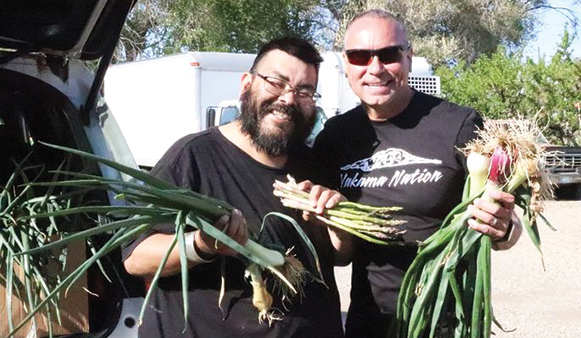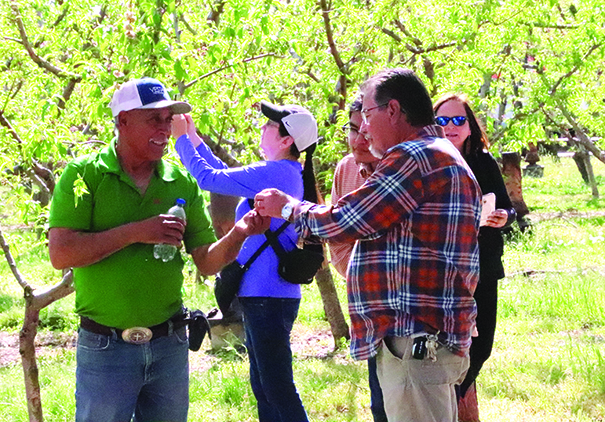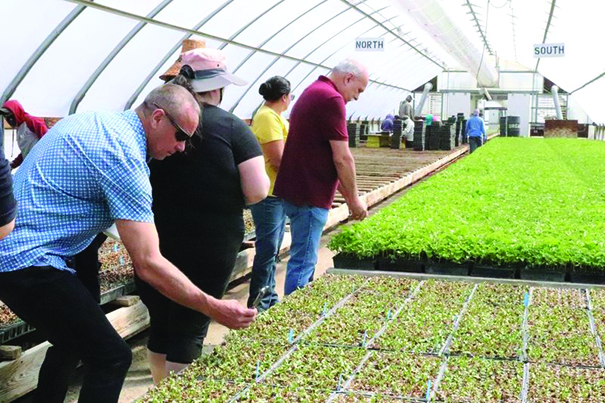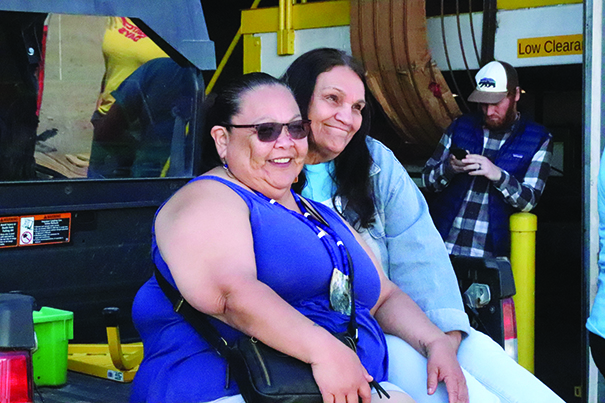
By Wade Sheldon, Tulalip News
Tribal elders and leaders, including Elders Commission Chairman Dale Jones, Interim Health System Administrator Dr. Gary Ferguson, and Diabetes Care and Prevention Coordinator Veronica Leahy, along with many other workers from different organizations in Tulalip journeyed across the mountains to visit Magana Farms and Yakama Nation Farms. This two-day trip, which took place on April 30 and May 1, was organized to explore partnerships with Indigenous agricultural operations and to gather ideas to strengthen Tulalip’s food sovereignty and trading opportunities. Notably, tribal member Rudy Madrigal helped organize the trip to support this initiative, emphasizing the importance of collaboration in enhancing community livelihoods.

The visit was centered on collaboration and education. “What we want to do is build a bridge and create a connection,” said Madrigal, who facilitated the visit. “Not just with vegetables, but with stone fruits, apples, cherries, peaches — and bring that variety back to our people.”
Magana Farms in Sunnyside, WA, offered insight into their unique approach to farming. Known for a wide range of fruits, including white peaches, candy apricots, cherry plums, donut peaches, and nectarines, they supply schools, local markets, and have held a booth at Pike Place Market since 1995. “Since 1995, we’ve been at the same table,” shared farm manager Tovias Magana. “You’ll never taste fruit like this unless you get it fresh, picked right from the tree.”
The farm operates with a commitment to eliminating waste. Any unsold produce is dehydrated and repurposed. “Any fruit that doesn’t sell gets turned into something else. Apple chips, dried peaches — everything is used,” Madrigal explained.

For Tulalip, the visit to Magana Farms reinforced the vision of creating a community-based, self-sustaining food system. “Imagine our people processing deer, elk, clams, and berries in a shared space with freeze dryers, canners, and vacuum sealers,” Madrigal said. “Distributing that to elders who can’t hunt or gather — it’s about creating access and building security through our foods.”
The next stop was Yakama Nation Farms, a 1,500-acre operation purchased by the Yakama Nation in 2021. Fully functional from seed to shipment, the farm welcomed Tulalip visitors to observe their operations and discuss the potential for future trade. Interim General Manager Jonalee Squeochs led the tour.
Dr. Ferguson reflected on the importance of the visit, saying, “I want to acknowledge our elders and invite them to share their thoughts so we can work towards healthier individuals and a healthier nation. Food is vital to our health; we should return to traditional foods and practices from our ancestors. It’s exciting to see efforts that highlight community engagement.”
Elders Commission Chairman Dale Jones also spoke, emphasizing unity and shared learning. “I want to thank you for allowing us to come visit, learn what we can, and share the brotherhood and sisterhood we have,” he said.
Veronica Leahy expressed hopes for continued collaboration. “The idea of growing food on a large scale has evaded us, and I’m hoping this group from many departments can be inspired by what we’ve seen here,” she said. “I want to do a work exchange with Jonalee, to show her what we are doing with Box of Goods and how we provide food for our patients.”
Squeochs detailed the farm’s evolution: “We started with five or six different crops and have now expanded to a certified organic farm covering 500 acres. Our goal is to grow our organic program to meet market demand and respond to requests for healthier options.”
As a predominantly wholesale operation supplying major retailers like Fred Meyer, Safeway, and Walmart, Squeochs highlighted a significant concern. “I went to Safeway looking for our produce, but it often ends far away, even to California. We want to develop local food systems to enhance food security in rural and tribal areas where supply chains struggle to reach.”
She stressed the importance of food sovereignty and culturally relevant food options. “Food equity matters because it reflects who is cooking and how it relates to cultural practices,” she said. Squeochs also emphasized the connection between health and traditional diets. “Chronic diseases in our communities are linked to a lack of access to our first foods,” she added.

Finally, she shared Yakama Nation’s long-term agricultural strategy. “In 2019, our council initiated a plan to create a diversified agriculture program to manage our lands more sustainably and improve local food production.”
The Yakama Nation recognizes the importance of collaboration and innovation in achieving these goals. They aim to integrate traditional practices with modern agricultural techniques by leveraging community resources and expertise. This approach not only honors their heritage but also ensures the resilience of their food systems in the face of climate change and economic challenges.
When asked about collaborating with Yakima Farms and Tobias Farms to enhance self-sustainability, Assistant Biologist Teesha Osias expressed, “I think it’s a fantastic opportunity, mainly because we’re at the early stages. Seeing what they offer and bringing those ideas home is incredible. This event is significant, and I feel honored to be at the table. This will fundamentally change how our reservation is perceived and enhance the Indigenous trading network. To be able to help my child move in this direction is a dream come true. I can’t believe this is happening, and there’s no turning back now. We’ve already acquired some equipment for our processing center with the help of grants, so now we need to find the right people to keep the momentum going.

As for the trip, I’m excited to return; there’s so much work to do, and many valuable connections and conversations ahead,” continued Osias. “We are developing a five-year work plan for our food service, including hiring a director to oversee everything. We are working together to keep that vision alive and connect our community partners and programs with natural resources. They must understand our current position and aspirations.”
The journey proved to be both inspiring and productive, offering valuable insights and forging new relationships. The connections made and lessons shared are laying the groundwork for future collaborations, with a shared vision of building stronger, more self-sufficient tribal food systems.